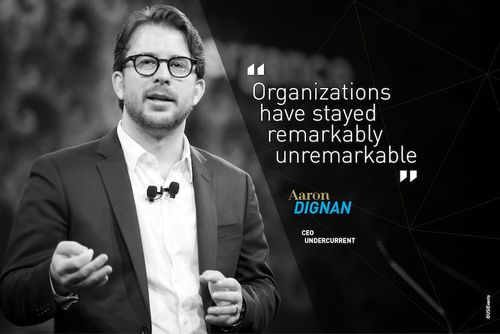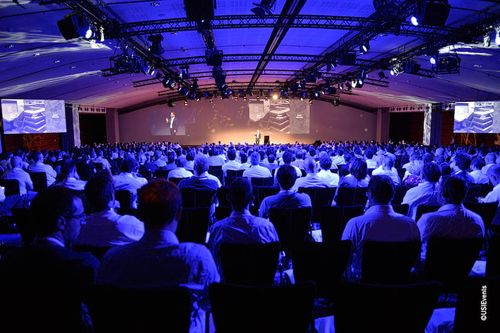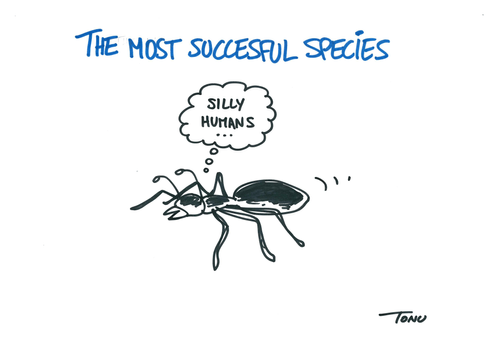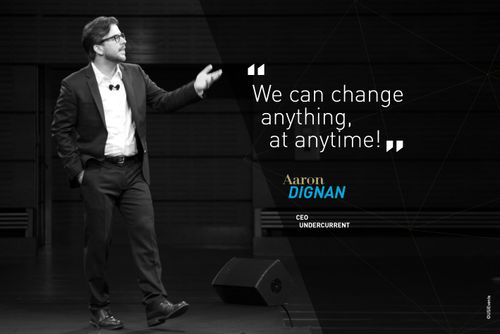Aaron Dignan - The Responsive Organization
Bringing the digital spirit to businesses in real time.
Major companies no longer slowly decline over sixty years, it now only takes fifteen! Our connected world is more and more complex and uncertain, with competition, information and volatility ever on the rise...
Recent changes have put a lot of pressure on businesses – but this pressure is manageable. The major players in the digital world prove this by coming up with solutions to stay proactive and grow their business using a digital mindset.
From profit to purpose
For Aaron Dignan, CEO of the consulting firm Undercurrent, it is practically a crime to continue to run businesses as they were run five, ten, or even one hundred years ago. The negative impact directly translates into active employee disengagement (17.5% in the US) and above all a loss of interest (51%). To re-motivate them, you have to change from being profit driven to being purpose driven. "Companies with a world-changing purpose attract the best talent" affirms Aaron Dignan. This does not mean that profit does not count, just that it is unthinkable without a strong ultimate purpose.
In the past, businesses had no choice but to grow linearly, this is no longer true thanks to the advent of platforms. For example, Amazon's Web Services have served as a base for companies that came after. As Aaron Dignan puts it: "It creates the ability to stand on the shoulders of people around us."
Leveraging networks
Lastly, with better networks "you don't only connect people but also things. With the Internet of Things, if you have a great idea, then it will spread throughout the network faster than ever before". The power of networks can be seen with Uber, which invented neither the GPS, nor the car, nor a delivery service, nor an operating system, but was able to identify the very small space, the "thin layer" between those who have a car and those who need transportation. The networks were already in place, the start-up simply capitalized on them. Airbnb is based on the same model.
Favoring emergence
For innovation and new ideas to happen, you need emergence, as illustrated by our immune systems: competitiveness towards pathogens or other attackers generates lymphocytes which hunt pathogens. Like start-ups, they innovate continuously. For emergence to happen, you have to step back from planning: "you have to design to let the future emerge" warns Aaron Dignan.
This conviction is shared by Valve, a software and hardware infrastructure company specialized in gaming, where new employees are expected to hook up with "other great people like you" and to use their desks on wheels to obtain flexibility in their work.
When a structure is too complex it has to be unpacked to foster accelerated change, on the model of companies with no unified theory, like Google and Tesla, or even the shoe company Zappos with its "holacratic" organization.
Getting inspiration from natural systems
Inspiration can also come from more natural systems, from autonomous ants to our immune system, which gets its strength from its capacity to change and breathe despite pressures.
This entails moving from a silo system, where groups are partitioned, to an adaptive network system, and can be done without any radical transformation. Sometimes one project is enough to modify an organization, to steer it away from silos towards an interconnected structure. Adapting staff and management to fit the project is important, even if the project is small. The impact on motivation affects the entire company.
Organizations, like connected societies, must accept the transition from "a private world where everything is secret to the way of the future, which is transparency" Aaron asserts. There is value in sharing information which some would tend to keep confidential. This best practice is illustrated by the outdoor equipment company Patagonia which made its entire production chain public. The feedback they received was mostly highly useful.
Businesses anchored in the digital economy are an invitation to focus on adaptivity rather than efficiency, to refuse to be content with a factory which makes only one product but instead to rise above the standard model.



